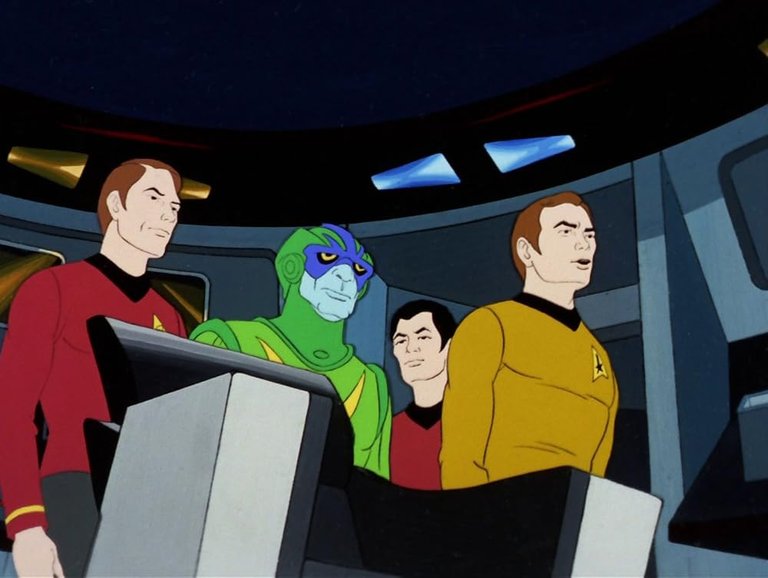Television Review: The Pirates of Orion (Star Trek: The Animated Series, S2X01, 1974)

The Pirates of Orion (S02E01)
Airdate: September 7th 1974
Written by: Howard Weinstein
Directed by: Bill Reed
Running Time: 22 minutes
The Star Trek: Animated Series, often overlooked in discussions of the franchise’s canon, marked a pivotal shift toward engaging younger audiences, suggesting that the future of Star Trek lay in the hands of emerging generations. Nowhere is this ethos more evident than in The Pirates of Orion, the season-two premiere that epitomises the show’s ambition to revitalise the franchise with fresh, youthful energy. At its heart lies the groundbreaking achievement of Howard Weinstein, the episode’s writer, who at just 19 years old became the youngest credited Star Trek writer in history—a record he still holds today. This episode, a triumph of audacious storytelling, underscores how the Animated Series leveraged its unconventional approach to redefine the boundaries of science fiction entertainment.
Weinstein’s journey to Star Trek fandom began during his middle school years, where he became captivated by the original series. His passion led him to craft a Star Trek-themed story for his school newspaper, which he later adapted into a teleplay. Demonstrating remarkable tenacity, he submitted his work to Gene Roddenberry’s production team. To his delight, not only was the script accepted, but it was also chosen to open the second season—a decision that validated his vision and cemented his place in franchise lore. The episode’s origin story is a testament to the power of fan creativity, proving that even the youngest voices could shape the narrative of a beloved universe.
The plot of The Pirates of Orion unfolds with the USS Enterprise en route to Deneb V for ceremonial duties when the crew encounters choriocytosis, an infectious disease. While easily treatable for humans, the ailment proves lethal for Vulcans due to their copper-based blood. Spock, infected during the mission, faces imminent death unless treated with strobolin, a rare drug. The nearest supply is aboard the Federation freighter SS Huron, which the Enterprise is due to rendezvous with. However, the Huron is ambushed by an Orion vessel, which steals its cargo of dilithium crystals and strobolin. After rescuing survivors, Kirk pursues the Orions to an asteroid belt, where he engages in a tactical game of cat-and-mouse. The Orion captain, aware of his inferiority to the Enterprise, negotiates a deceptive truce: he agrees to provide strobolin in exchange for immunity, but his true aim is to destroy both ships to avoid exposing Orion’s violation of neutrality with the Federation. Kirk’s crew uncovers the ruse, foils the plan, and saves Spock.
The episode dismantles the reductive portrayal of Orions as mere exotic, scantily clad women—a trope entrenched in earlier Star Trek episodes. Instead, Weinstein’s script elevates them as formidable adversaries, showcasing their cunning intellect and strategic prowess. This nuanced depiction builds on their earlier introduction in The Original Series’ Journey to Babel, where they were hinted at as politically complex figures. Here, they emerge as multidimensional antagonists, challenging the audience to see beyond superficial stereotypes. Their portrayal as calculating pirates underscores the Animated Series’ willingness to expand the franchise’s mythos while respecting its roots.
Weinstein’s narrative exhibits razor-sharp pacing, avoiding unnecessary subplots to focus on a taut, suspenseful core. The script mirrors the tension of The Original Series’ Balance of Terror, where the Romulans’ perspective deepened the stakes. Similarly, The Pirates of Orion grants the Orion captain agency, framing the conflict as a clash of wits between two leaders—Kirk and his counterpart. This structure amplifies the episode’s dramatic weight, as both sides manipulate circumstances to survive. The blend of action and moral ambiguity creates a gripping narrative that rewards close attention, a hallmark of the Animated Series’ ambitious storytelling.
The episode’s production history reveals the behind-the-scenes challenges of the Animated Series. Directed by Bill Reed, who replaced Hal Sutherland after season one, The Pirates of Orion suffered from Filmation’s cost-cutting measures. Despite Reed’s involvement, the end credits retained Sutherland’s name, perpetuating confusion among viewers.
For Weinstein, The Pirates of Orion was a career-defining moment. Though he did not write additional screenplays for the franchise, his success paved the way for a prolific career in Star Trek literature and comics. His ability to transform a school project into a canonical episode exemplifies the Animated Series’ ethos of nurturing new talent. The episode itself remains a beacon of the franchise’s potential to evolve, proving that innovation and youth could coexist with the legacy of Gene Roddenberry’s vision.
RATING: 7/10 (+++)
Blog in Croatian https://draxblog.com
Blog in English https://draxreview.wordpress.com/
InLeo blog https://inleo.io/@drax.leo
InLeo: https://inleo.io/signup?referral=drax.leo
Leodex: https://leodex.io/?ref=drax
Hiveonboard: https://hiveonboard.com?ref=drax
Rising Star game: https://www.risingstargame.com?referrer=drax
1Inch: https://1inch.exchange/#/r/0x83823d8CCB74F828148258BB4457642124b1328e
BTC donations: 1EWxiMiP6iiG9rger3NuUSd6HByaxQWafG
ETH donations: 0xB305F144323b99e6f8b1d66f5D7DE78B498C32A7
BCH donations: qpvxw0jax79lhmvlgcldkzpqanf03r9cjv8y6gtmk9
Congratulations @drax! You have completed the following achievement on the Hive blockchain And have been rewarded with New badge(s)
You can view your badges on your board and compare yourself to others in the Ranking
If you no longer want to receive notifications, reply to this comment with the word
STOPCheck out our last posts: